How to Get Rid of Pre-Workout Sickness?
Author:
Unlock your full potential by engaging with our experts and community! Have questions about your fitness journey or looking for expert advice on weightlifting techniques? Don’t hesitate — leave a comment below and Oleksandr Maksymenko will provide a personalized answer and insights to help you reach your goals.
Torokhtiy is reader-supported. Some links are affiliate links, and we may earn a commission at no extra cost to you. See our disclosure page for details.
Pre-workout supplements can be a great way to boost your energy and performance during a workout, but for some people, they can also cause unwanted side effects such as nausea, dizziness, and headaches.
This is commonly referred to as “pre-workout sickness.” In this article, we will take a closer look at six reasons why your pre-workout supplement may be making you sick, and how to get rid of pre workout sickness.
From caffeine sensitivity to dehydration and unwanted interactions with medication, we will explore the most common causes of pre-workout sickness and provide practical tips and solutions to help you overcome these symptoms and enjoy the benefits of your pre-workout supplement without the negative side effects.
If you wonder how to get rid of pre workout sickness you need to stop exercising and relax until pre-workout nausea subsides. Hydrate and unwind. Listen to your body and alter your pre-workout regimen. Consult with your doctor if the symptoms won’t go away.
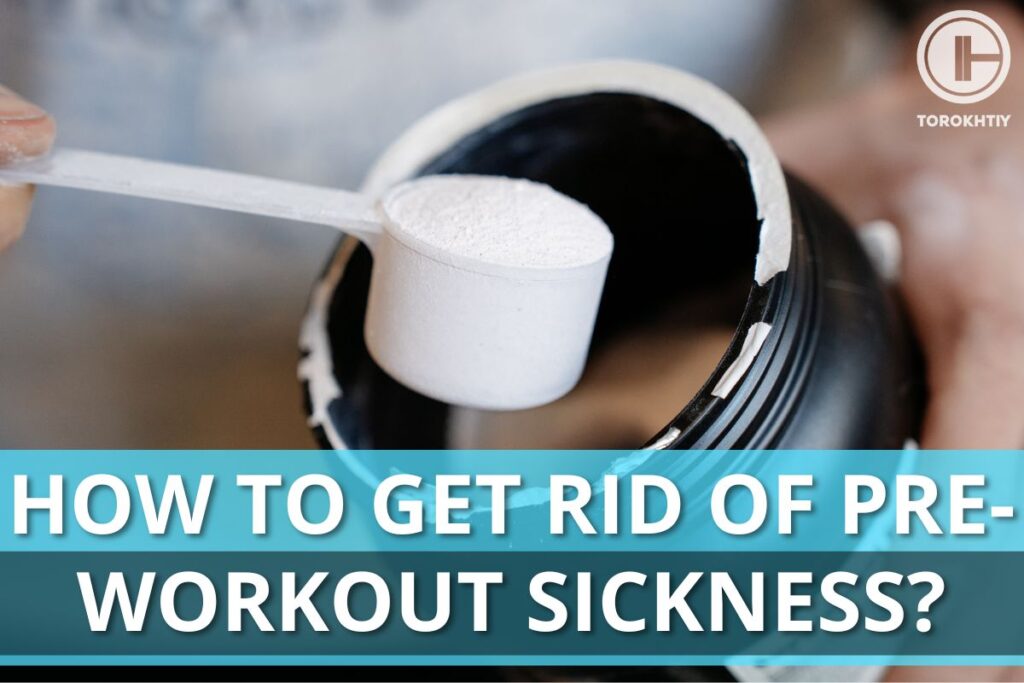
Reasons Why Your Pre-Workout is Making You Sick?
1. Overdosing and How to Fix It
Consuming too much of a pre-workout supplement can lead to an overdose, which can cause a range of symptoms such as nausea, vomiting, and dizziness. This is because many pre-workout supplements contain high levels of caffeine and other stimulants, which can be dangerous when consumed in large quantities.
Additionally, some pre-workout supplements may also contain large amounts of other ingredients such as creatine, beta-alanine, and nitric oxide, which can also cause adverse reactions when consumed in excessive amounts.
Usually the normal amount of caffeine a grown up should take during the day is up to 400 mg. If you overdosed on your pre-workout, the first step is to stop taking the supplement immediately.
Then, hydrate yourself by drinking plenty of water, rest and avoid strenuous activity, monitor your symptoms, consult with a doctor if symptoms worsen, take over-the-counter medication for symptoms such as headache, nausea or vomiting and follow a balanced diet.
2. Allergic Reaction and How to Fix It
Some people may be allergic to certain ingredients found in pre-workout supplements, which can cause allergic reactions such as hives, itching, and difficulty breathing. These reactions may be caused by ingredients such as artificial sweeteners, food dyes, or preservatives.
It’s important to check the ingredients list on the supplement label before consuming it and if you have any history of allergies, consult with a physician before taking any supplement.
If you are having an allergic reaction to your pre-workout supplement the first step is to stop taking the supplement immediately, take antihistamines, use a cold compress, seek medical attention if experiencing severe symptoms, identify the allergen, keep an epinephrine auto-injector if you have a history of severe allergic reactions and consult with a doctor to determine if there are any underlying conditions that may have contributed to your allergic reaction and to develop a plan to manage your symptoms and prevent future reactions.
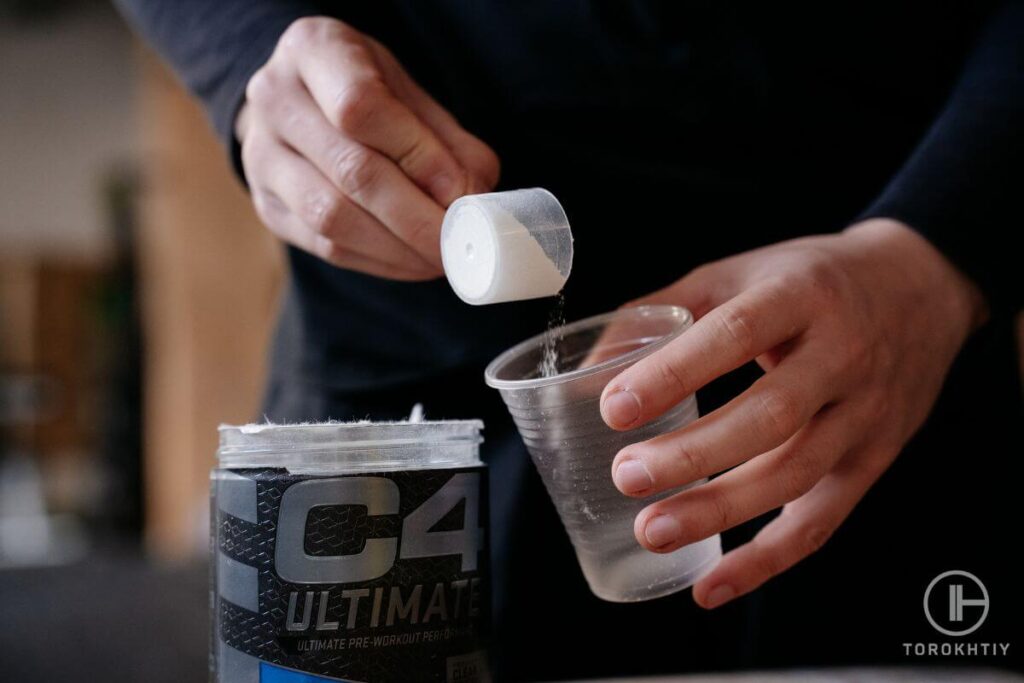
3. Caffeine Sensitivity and How to Fix It
Caffeine is a common ingredient found in pre-workout supplements, and it can cause jitters, anxiety, and nausea in people who are sensitive to the stimulant. This is because caffeine is a stimulant that increases heart rate, blood pressure, and can cause increased anxiety and nervousness.
If you are sensitive to caffeine, you may want to consider a caffeine free pre-workout or avoid pre-workout supplements altogether.
If you experience caffeine sensitivity caused by the pre-workout you are taking you need to reduce your intake of caffeine throughout the day.
After your symptoms have calmed down, gradually increase your intake of it, take caffeine earlier in the day, hydrate yourself, monitor your symptoms, consult with a doctor if experiencing severe symptoms or if you have pre-existing medical conditions, and try alternative supplements that do not contain caffeine.
4. Dehydration and How to Fix It
Pre-workout supplements can cause dehydration, which can lead to symptoms such as dizziness, nausea, and fatigue. This is because many pre-workout supplements contain ingredients that increase blood flow and promote sweating, which can result in the loss of fluids and electrolytes.
To avoid dehydration, it’s important to drink plenty of water before, during, and after your workout, and replenish electrolytes by drinking sports drinks or eating foods high in electrolytes.
If you are experiencing dehydration symptoms because of your pre-workout supplement you need to drink plenty of water, electrolyte replacement, take a break from physical activity if experiencing severe dehydration, monitor your urine color, consult with a doctor if experiencing severe symptoms, incorporate hydration into your daily routine and monitor your fluid intake to make sure you get rid of the symptoms as fast as possible.
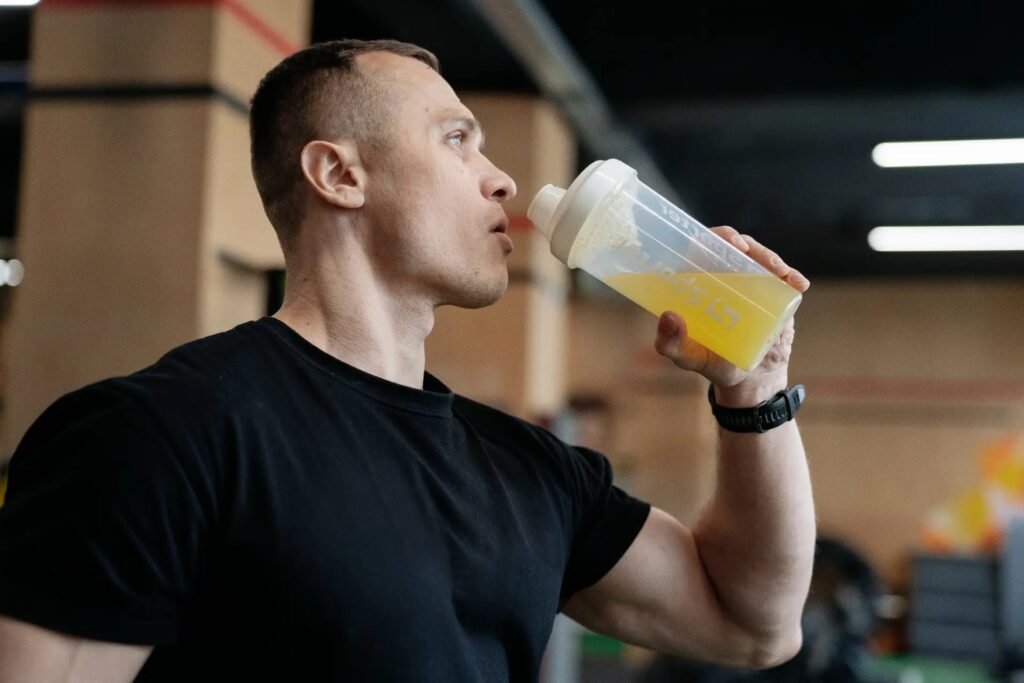
5. Interaction with Other Medication and How to Fix It
Pre-workout supplements can interact with certain medications, such as blood thinners, and can cause adverse reactions.
This is because many pre-workout supplements contain ingredients such as caffeine, creatine, and nitric oxide, which can affect blood flow and blood pressure. If you are taking any medication, it’s important to consult with your doctor before taking any pre-workout supplement.
If you experience symptoms of abnormal blood flow and blood pressure caused by pre-workout supplements interacting with other medication, you should take steps such as stop taking the supplement immediately. Then, consult with a doctor or healthcare professional to determine if the supplement is safe for you to take.
Keep an eye on your symptoms, check your blood pressure and heart rate regularly, follow a healthy diet and lifestyle, try alternative supplements, and consult with a doctor about any pre-existing medical condition.
6. Not Taking the Recommended Dosage and How to Fix It
Not following the correct dosage can lead to overconsumption of the supplement and resultant symptoms. The recommended dosage of pre-workout supplements can vary depending on the product and the individual. It’s important to follow the manufacturer’s recommended dosage and not exceed it.
Additionally, it’s also important to not to take pre-workout supplements on an empty stomach as it can lead to stomach discomfort and cramps.
Optimal doses of pre-workout supplements vary depending on the product and the person taking it however it’s best to start with a lower dose so aim to start somewhere between 3mg/kg – 6mg/kg of caffein per body weight.
If you took more than the recommended dosage and you are experiencing unwanted symptoms you need to make sure you follow the recommended dosage on the label, gradually increase your dosage, monitor your symptoms, follow a balanced diet, and hydrate yourself.
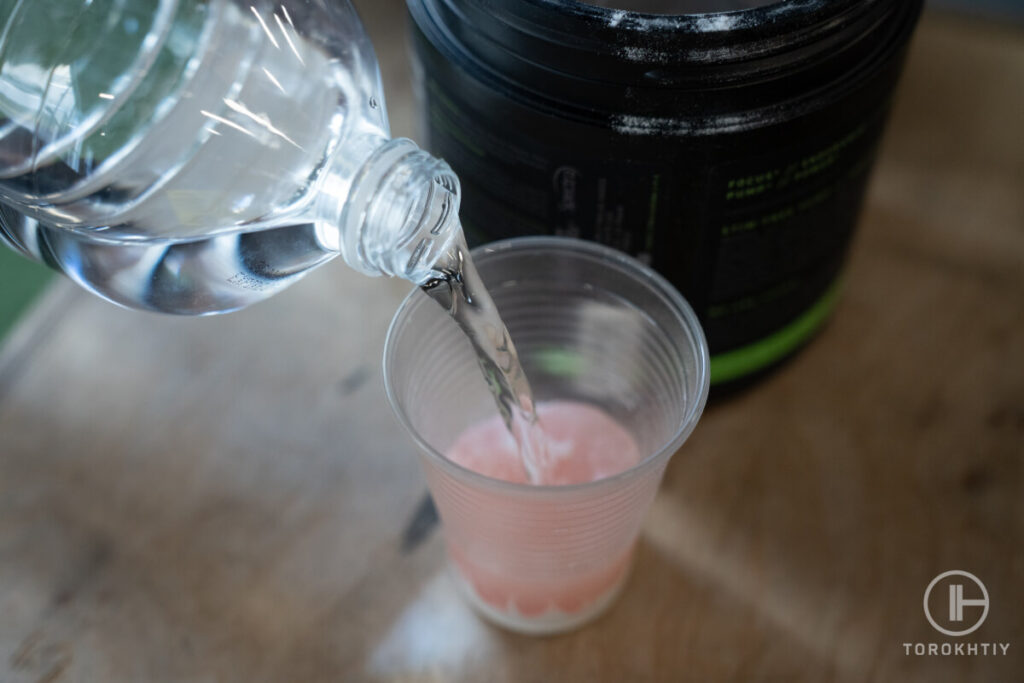
Choosing a Pre-workout that Doesn’t Make You Nauseous
Choosing a pre-workout supplement that doesn’t make you nauseous can be challenging, but there are a few things you can keep in mind to help make the process easier. Here are some steps you can take:
1. Read the Label
Look for supplements that are low in caffeine, as caffeine can be a common cause of pre workout nausea. Avoid supplements that contain large amounts of artificial sweeteners, as these can also cause stomach upset.
2. Start with a Lower Dose
Start with a lower dose of the supplement, and gradually increase it over time as your body becomes accustomed to it.
3. Know the Ingredients
Be aware of ingredients that you may be sensitive to, such as gluten or lactose. Also, make sure to check if you are allergic to any of the ingredients in the supplement.
4. Check for Reviews of the Product
Check for reviews from other users to see if they have experienced any stomach issues or nausea with the supplement you’re considering.
5. Consult with Your Doctor
If you have pre-existing medical conditions or are taking any medication, consult with a doctor or healthcare professional to determine if the supplement is safe for you to take.
Our Recommended Pre-Workout
Huge Supplements Pump Serum
- Form: Powder
- Ingredients: L-Citrulline, Betaine, Arginine Silicate, Pomegranate Extract, Glycerol, Beetroot Extract
- Flavors: Island Dream, Strawberry Mojito, Jungle Juice, Cherry Berry
- Package Information: 620g
- Serving Size: 14.9 g
- Price Per Serving: ~$1.38
- Company Founded: 2019
- Recommended by Athletes: Matt Greggo, Tren Twins, Max Taylor
If you dislike stimulant-containing pre-workouts, Pump Serum is the product for you.
This pre-workout is a stim-free supplement designed to improve pump, muscular fullness, training capacity, and attention. Pump Serum includes 13 potent and some unique substances to help you perform better during your workouts.
Because each component is dosed optimally for best efficacy, each serving contains more than 31 grams. You can have fantastic, high-intensity exercises without worrying about crashing afterwards.

Pump Serum is easy to use: just combine one full scoop with 8 to 12 fl oz of water or your favorite beverage around 30 minutes before hitting the gym.
FAQ
Is It Okay to Take Pre-workout on an Empty Stomach?
Taking pre-workout on an empty stomach is safe but it can cause some unwanted side effects such as jitters and anxiety. That’s why it’s much better to take your pre-workout with nutritious food or a smoothie.
Can Pre Workout Make You Throw Up?
Pre-workout may make you nauseous due to improper dose, harmful substances, or compounds that do not fit your specific system, causing you to vomit after taking the supplement.
Can Pre Workout Make You Nauseous?
Yes, pre-workout supplements can make some people feel nauseous. This can be due to a variety of factors, such as consuming too much caffeine, taking the supplement on an empty stomach, or having an adverse reaction to one of the ingredients.
Can Pre Workout Make You Sick?
Pre-workout supplements can make some people feel sick. This can be due to various reasons, including consuming too much caffeine, taking the supplement on an empty stomach, having an adverse reaction to one of the ingredients, or consuming a product that is expired or contaminated.
If you are feeling sick after pre workout consumption, make sure you consult with your doctor about how to proceed.
Why Does Pre Workout Make Me Feel Sick?
Pre-workout supplements can make some people feel sick due to factors such as consuming too much caffeine, taking the supplement on an empty stomach, having an adverse reaction to ingredients, dehydration, consuming expired or contaminated products, and not adjusting to the ingredients.
Start with lower doses and gradually increase it over time, and if experiencing persistent or severe side effects, consult a doctor.
How Long Does Pre Workout Sickness Last?
Pre-workout sickness often lasts for 30 minutes to three hours and ultimately goes away after that but if the symptoms persist make sure you call a doctor.
Conclusion
In conclusion, pre-workout sickness can be caused by a variety of factors such as consuming too much caffeine, dehydration, and more.
To prevent pre-workout sickness, start with a lower dose of caffeine and gradually increase it over time, stay hydrated, and listen to your body. If you experience pre-workout sickness, it is best to stop working out and rest until feeling better.
Consult with a doctor if symptoms persist or worsen. Remember that everyone’s body reacts differently, so it’s important to experiment and find what works best for you. Feel free to let us know what works best for you and how you got rid of the pre-workout sickness when you experienced the symptoms by using the comment section below.
Also read:
- Pre Workout With Most Caffeine
- Best Total War Flavor
- How To Make Pre Workout Taste Better
- How Long Does Pre Workout Last
- What Does Pre Workout Feel Like
- Best Pre Workout Powder With Creatine
- When to Take Pre Workout
- Electrolyte Supplements Guide
- Nitric Oxide Supplements Guide
- What Is Non Stim Pre Workout
References:
- 5 Side Effects of Pre-Workout Supplements // Healthline: https://www.healthline.com/nutrition/pre-workout-side-effects.
- Caffeine: How much is too much? // mayoclinic: https://www.mayoclinic.org/healthy-lifestyle/nutrition-and-healthy-eating/in-depth/caffeine/art-20045678.
- Allergic Reactions to Pre-Workouts: Common Causes and How to Avoid Them // PerformanceLab: https://www.performancelab.com/blogs/pre/allergic-reactions-to-pre-workouts.
- Does Pre-workout Dehydrate You During Workouts? The Answer // TotalShape: https://totalshape.com/supplements/does-pre-workout-dehydrate-you/.
- Water, Hydration and Health // National Library of Medicine: https://www.ncbi.nlm.nih.gov/pmc/articles/PMC2908954.
- What to know about the side effects of pre-workout // MedicalNewsToday: https://www.medicalnewstoday.com/articles/pre-workout-side-effects.
- The Complete Guide To Pre-Workout Supplements // TheManual: https://www.themanual.com/fitness/pre-workout-supplements-guide.
- Photos are made by Torokhtiy Media team.
Why Trust Us?
With over 20 years in Olympic weightlifting, strength training, nutrition coaching, and general fitness our team does its best to provide the audience with ultimate support and meet the needs and requirements of advanced athletes and professional lifters, as well as people who strive to open new opportunities and develop their physical capabilities with us.
By trusting the recommendations of our certified experts in coaching, nutrition, and sports training programming, as well as scientific consultants, and physiotherapists, we provide you with thorough, well-considered, and scientifically proven content. All the information given in the articles concerning workout programming, separate exercises, and athletic performance, in general, is based on verified data.
The product testing process is described in more detail here.
Author: Oleksandr Maksymenko
Certified Sports Nutritionist,
MSc Sports Dietetics
Specializing in: Weight management, Fitness / Sports nutrition
Oleksandr is a professional fitness nutritionist certified by the Fitness Professional Association (FPA). He follows the principles of evidence-based dietetics and fosters a healthy relationship with food in his clients, ensuring there are no strict prohibitions on their favorite foods or frequent lapses. His primary goal is not only to achieve results for you but also to sustain them over the long term, all while enjoying tasty and delicious food.



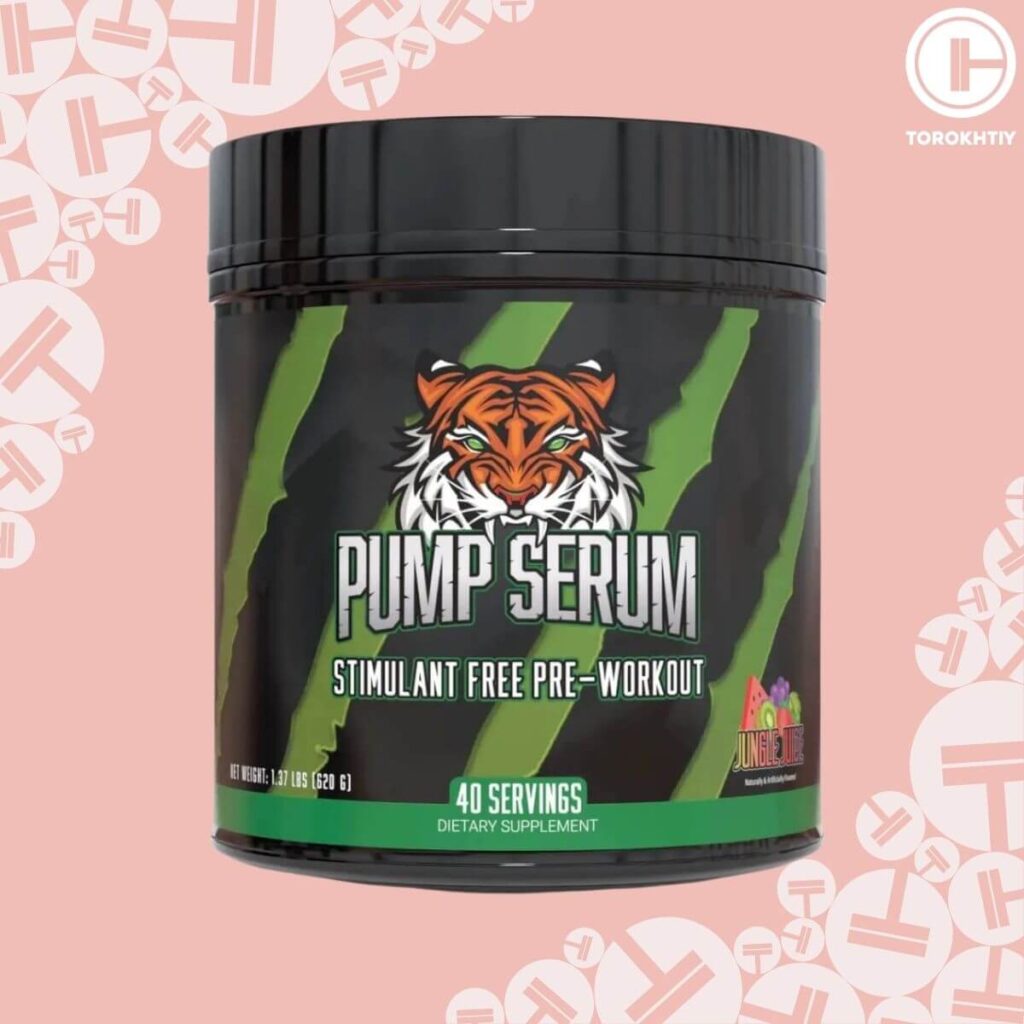
Still have questions after reading our article? Unlock your full potential by engaging with our experts and community! Don’t hesitate — leave a comment below and Oleksandr Maksymenko will provide a personalized answer and insights to help you reach your goals.